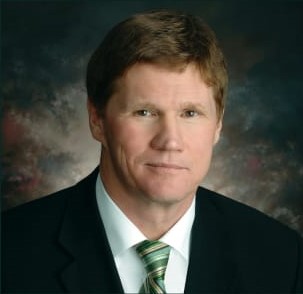Wisconsin’s professional sports teams are teaming up with Microsoft to form the Equity League, a new division of venture capital fund TitletownTech.
The news broke ahead of a WisPolitics.com-Milwaukee Press Club virtual event featuring the Milwaukee Bucks, Green Bay Packers and Milwaukee Brewers.
The first-ever social change partnership between the trio is likely to include investments in minority-owned firms from some of the players from each of the teams. TitletownTech has invested $25 million in 21 companies.
Packers President and CEO Mark Murphy (pictured above) said he thinks the Jacob Blake shooting in Kenosha this summer was an “inflection point” for the organization and his colleagues.
“It was really time to take action and to make a positive change and to make an impact,” he said. “It’s not often that professional teams come together like this particularly to address social justice issues. We were excited to be able to have the announcement today, and it looks like we’re getting positive publicity across the country.”
Adding to the state’s positive publicity was an announcement during the event from Bucks basketball star Giannis Antetokounmpo via Twitter. The NBA’s two-time MVP has signed a “supermax deal” as described by event guest reporter Jen Lada of ESPN. The five-year extension deal is worth $228 million.
“Giannis is a generational player, what it means to the Milwaukee Bucks, what it means to our market and to our team … it’s hard to really state the importance of it, this is a monumental kind of event,” Bucks President Peter Feigin said after reading Antetokounmpo’s tweet to the panel. “This is one of the great days in Bucks history, so this is a really great, great moment.”
Star players that become committed to the community and fall in love with the city and the state, such as Antetokounmpo, the Packers’ Aaron Rodgers and the Brewers’ Christian Yelich, “become legends,” said Milwaukee Admirals President Jon Greenberg, another panelist.
They also drive fan engagement, said Rick Schlesinger, president of business operations with the Brewers.
“For great players to stay in the Midwest and stay in Wisconsin, I think it helps cement the relationship you have with your fans,” he said. He added that now, it’s incumbent upon the organization to fill the team around the star players so Wisconsin’s teams can compete for championships.
Major League Baseball relies on ticket sales and fans in the stands, Schlesinger said. That has put the Brewers in a “daunting” financial situation during the pandemic. While teams recognize that 2020 was a unique year and were able to get a short season in, it wasn’t a good financial model for the team paying players the full game rate for the 60 games.
“If there’s an opportunity for us, not just in Milwaukee but across the league to have fans in the stands if we can do so and we start the season a little bit later, that to me is a logical thing to do,” he said. “Even if we have a somewhat shortened season, to have an opportunity to have fans in the stands for the first game would be a tremendous thing not only for the players but also for our revenue.”
He added that even with fans there’s no scenario in which it’s going to be a great season financially for the Brewers due to restrictions, costs of protocols and testing, and retrofitting the ballpark to accommodate fans. However, Schlesinger said there is a pathway in conjunction with the MLB Players Association — the bargaining agent for all MLB players — to make the financial hit less severe on teams.
“The players recognize that the more that the teams are financially in better shape, that’s better for their pocketbook as well because at the end of the day, players’ salaries do have a nexus to club revenues.”
Fans are excited to return to the ballpark — season ticket renewals for the Brewers are at 94 percent. And Schlesinger said incentivizing people to take the vaccine may be helpful, including opening up access to certain venues for those who are vaccinated.
“Sports can be a great way to heal and bring people together and get us through some difficult times. … Let’s try to do everything we can to make that happen,” he said.
With an indoor arena, Feigin said filtration and ventilation are being considered when looking at modifying the stands. The Bucks are also looking at integrating COVID-19 vaccine passports and tracing or testing in the ticketing system.
The Admirals are waiting for a health department OK when it comes to relieving restrictions and bringing in fans.
“The quicker people take the vaccine that makes people comfortable with the healthy departments that will allow these things to be eased. We’ll be ready to go, but we want to be ready to start the ‘21-’22 season on time in October,” Greenberg said.
Unlike the other teams, about two-thirds of Packers’ revenue comes from a national TV contract. The team has had at most roughly 500 fans at Lambeau consisting primarily of family. The focus has been to get the games on, not put fans in the stands.
Murphy referred to comments from National Institute of Allergy and Infectious Diseases Director Dr. Anthony Fauci that by the fall, stadiums could be full for football games. Murphy also advocated for President-elect Joe Biden’s request to mask up for 100 more days.
“We need to really be careful over these next few months and that should make it better as we go forward,” he said. Ahead of the NFL playoffs, he said the status of the virus and the views of local health officials will determine if fans will be welcome. The next two home games will continue to be invited guests only.
“We’d love to have fans, but we’re not going to put the community at risk or our players,” Murphy said. “As you get into the playoffs, you’ve got so much at stake … particularly, our players catching the virus prior to the playoff game would be a shame.”
Watch the video: https://www.youtube.com/watch?v=kWHJLAYQYtw
-By Stephanie Hoff
WisBusiness.com






